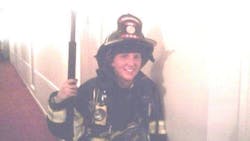Oct. 09 -- Country Club Hills has forfeited its defense of a female firefighter’s 2012 sexual harassment and gender discrimination lawsuit over its repeated failure to comply with court orders, a judge has ruled.
Judge Brigid Mary McGrath entered the Oct. 2 default judgment after a lawyer for firefighter Dena Lewis-Bystrzycki presented a recently discovered fire department memo the city had not turned over, despite city officials’ prior claims under oath that all responsive documents had been produced.
McGrath entered the default order on the second and third counts of Lewis-Bystrzycki’s suit, which allege gender discrimination and hostile work environment in violation of the Illinois Human Rights Act and retaliation in violation of the Illinois Human Rights Act.
Unless McGrath vacates her order — an attorney for the city has filed a motion for reconsideration that will be heard Tuesday — the city would be liable for paying damages to Lewis-Bystrzycki in an amount to be determined by a jury, Country Club Hills attorney Stephen Miller said.
“It kind of depends on her ruling (Tuesday) as to whether we have a full blown trial or a trial on the default,” he said Monday. “And we really don’t know what’s cooking yet and won’t know until the judge rules.”
The recently discovered document, a June 11, 2010 memo from the former fire chief, states that Lewis-Bystrzycki is to be promoted to lieutenant following the retirements of two lieutenants. She never received the promotion, however, and has alleged in court filings that gender discrimination and harassment were the reason.
Had the 2010 memo been turned over when ordered, the case would likely have already settled, Dana Kurtz, the lawyer for Lewis-Bystrzycki, argued.
Instead, Kurtz said, her client had not been promoted, no longer had a career — she’s been on paid leave from the department since 2015 — and had incurred $1.7 million in attorneys’ fees and expenses as a result of the city’s failure to produce the document.
“It’s just by chance that (plaintiff’s forensic expert Andrew Garrett) found this document last night,” Kurtz told the judge, according to a court transcript. “It should have been produced two years ago. It would have changed the nature and course of this litigation dramatically.”
Garrett testified that his forensic analysis of the Country Club Hills fire department’s computer workstations and email server showed the city never searched them for documents relevant to the lawsuit, as it had been ordered to do.
“It’s clear that there’s absolutely no searches for even the plaintiff’s name,” he said.
Miller acknowledged in court that the city had failed to produce documents, but denied that it never performed searches for documents.
“I understand they’re our computers, but obviously we did a search, and we didn’t come up with this, and there may be a technological explanation why,” he said, according to a court transcript.
McGrath responded that “so many technological issues” had arisen over the course of the litigation that it was “extraordinary.”
“I don’t know what else is out there,” she said.
“I don’t either,” Miller replied.
Garrett’s testimony that the city had not searched its computers for documents relevant to the lawsuit came just months after the judge sanctioned Country Club Hills for destroying digital evidence that its firefighters regularly viewed pornography on department computers, despite having received notice to preserve its computer files.
In rendering her Oct. 2 order granting default judgment, McGrath said that due to the city’s repeated failure to comply with her orders, the extent of relevant documents it had not produced could not be known.
“What other documents are out there that are responsive to plaintiff’s discovery requests that haven’t been produced? Who knows,” she said. “What other documents that were responsive to plaintiff’s document requests were destroyed by defendants’ anti-forensic tools? Again, who knows.
“All the court knows is that defendant has failed time and again to abide by the Court’s orders even though the Court gave defendant chance after chance over plaintiff’s vigorous and repeated objections.”
McGrath said that even before the previously untendered memo surfaced, she had planned to order that Country Clubs Hills reimburse Lewis-Bystrzycki for attorney fees and costs incurred to hire her forensic expert and to instruct the jury it could draw an adverse inference from the city’s “unreasonable and willful destruction of ESI data on their computers despite being under an obligation to preserve that information.”
But, the judge said, after the discovery of “weighty documents that should have been produced that weren’t,” she would reconsider her sanctions to include default judgment.
“Here we have a case in which defendant, despite giving — being given many opportunities, has failed to comply with the Court’s rules in two different ways; the first in actually searching the documents in its possession to ensure that all responsive documents are produced to the plaintiff and the second, to ensure that the information in its possession is maintained and not damaged,” McGrath said, according to a court transcript of last week’s proceeding.
“So I am going for the more drastic remedy of default, and I hate to do it, but I am going for the remedy of default in addition to the reimbursement for the fees and the expert fees and costs related to the third and fourth motions to compel.”
Miller filed a motion for reconsideration two days later, in which he said the judge had erred in granting “the most severe sanction possible.”
“The order for default judgment…should be vacated because the Defendant was not warned that default was being considered by this Court as a remedy for the discovery sanctions at issue, because the Court failed to apply progressive discovery sanctions, and because Defendant’s behavior does not amount to a deliberate, contumacious, or unwarranted disregard of the Court’s authority,” his motion argues.
Miller said Monday that McGrath’s order granting default judgment was technically misstated because her ruling isn’t final.
“It’s not actually a judgment, it’s just an order of default,” he said.
Miller said McGrath would likely rule Tuesday on his motion to reconsider the default. If she were to vacate the default order, the case would proceed to a jury trial, he said.
If McGrath upholds her prior order, the case would still proceed to trial, but the jury would be tasked only with determining the amount of damages, not the city’s liability, Miller said.
Kurtz, who agreed not to speak with the media at Miller’s request after the judge entered the default order last week, declined comment on the case.
Her client, a member of the Country Club Hills Fire Department since 1998, alleges in her suit that firefighters sexually harassed her and treated her in a hostile manner; engaged in gender discrimination when she came up for a promotion; retaliated against her for reporting misbehavior; and regularly watched pornography at the station.
___ (c)2018 The Daily Southtown (Tinley Park, Ill.) Visit The Daily Southtown (Tinley Park, Ill.) at www.chicagotribune.com/suburbs/daily-southtown Distributed by Tribune Content Agency, LLC.






